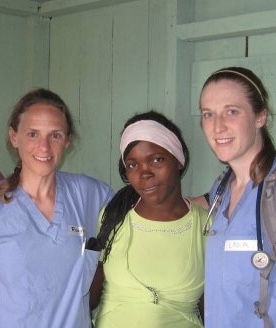Midwives: Drivers and Leaders in Addressing MNCH Gaps
By Robyn Churchill, Seed Global Health
Midwives have existed even before formalized health systems. We were the original healers, birth attendants, and confidantes. The role of the midwife has been improved upon and integrated into the healthcare sector, but historically, midwives have come from their communities, and in nearly every society on the planet, women go to midwives to birth their babies.
I was teaching in Newark, New Jersey, and on my way to graduate studies in education when I had a transformational experience with midwives. Just having had a baby with midwives in a birth center, I was supporting two of my students, providing advice to them as they navigated their ways through sub-par health services during their own pregnancies. I thought back to the quality and compassionate care I received from my midwives, and said to myself, “in another life, I would be a midwife.”
It’s a hard thing to say in your twenties, but the decision to leave my grad program and pursue midwifery was not just life-changing for me, but the beginning of a career where I could merge my passion for education with my dream of being a nurse-midwife.
Midwives are an incredibly important bridge linking women to their health system in so many parts of the world. In countries where midwifery students are identified and educated in their communities, there is a stronger link between women and their health centers. But sadly, there are many, many cases where midwives are frustrated and overwhelmed by demands, and their respectful treatment and quality of care can fall by the wayside among hectic, under-resourced, day-to-day task management. We know that when midwives are empowered with respectful environments, autonomy, reliable referral systems, and a functioning front line health system, they are the heart of ourhealth systems.
I was lucky to have learned from so many incredible midwives.
The nursing preceptor who advised me, "spend your free time in your patients' rooms – they will teach you what you need to know."
The OB/GYN at my first position who frequently reminded me to advocate for midwifery management, and would support me even if her approach would have been different.
The attending physician in the homeless shelter who said "listen to the patient, she will tell you her priorities."
My strongest mentor, though, was Dr. Kawada, the Chair of my OB/GYN department when I was a Director of Midwifery. He supported me as our midwifery service grew by 150% in four years, and helped me have a voice in department and hospital decisions. I was able to adapt and help guide that change process in creative new ways in part because he supported my initiative, providing guidance and never saying, "I told you so." In the end, there were far more successes than failures, and I developed skills and confidence which have served me well over the years.

Photo Courtesy of Robyn Churchill, Senior Midwifery Advisor, Seed Global Health.
Just as I was mentored to develop my clinical and leadership skills, midwives across Africa need support and opportunities to become drivers and leaders in addressing gaps in maternal and newborn health services. While it is helpful in the short-term to have American midwives support African midwives, our goal at Seed Global Health is for all communities to have access to locally trained and supported health workers.
Key to achieving this goal is greater inclusion of midwives in decision-making roles in the national government, because unless midwives' voices are represented at that level, policymaking decisions and priorities risk being misaligned with the needs on the ground.
Midwives are providing frontline care at health facilities, and know the challenges and gaps, but many midwives lack the management skills or confidence to address those systems issues. Even as more women come to health facilities to give birth, there has been a lag in improved outcomes. This is largely due to faulty systems management and inadequate planning for the increased patient volumes. It’s my hope that Seed can provide the expertise and tools required for midwives to not only provide excellent care, but also run health centers, labor wards, and antenatal care clinics efficiently and effectively. Midwives must be leading quality improvement initiatives alongside their colleagues.
As the principal attendants of mothers and newborns, midwives will have the skills to lead local and national mortality reviews, strategic planning, and policymaking. Through advocacy with their government partners, my hope is that Seed's impact will be felt in how decisions are being made, and how midwives' voices are solicited and heard as national strategies are developed, for the benefit of mothers and babies today and generations into the future.
